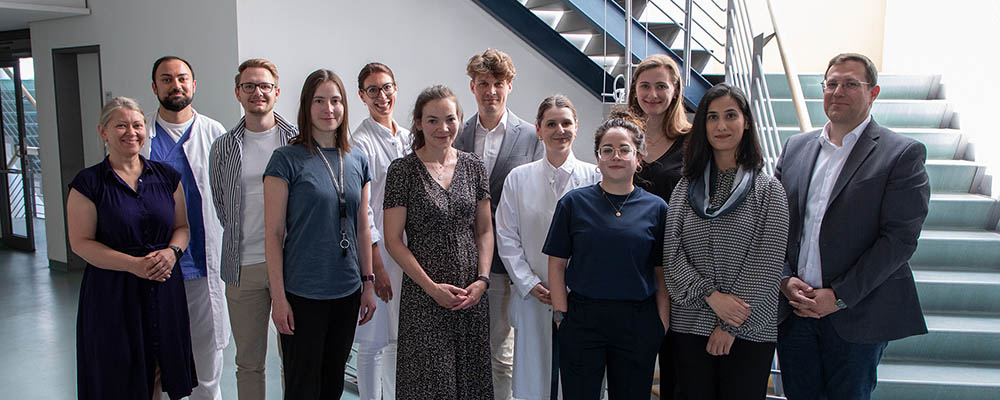University of Magdeburg promotes young researchers in medicine
Launch of the MED-4-SCIENCE Academy, a structured support programme for young scientists
The Faculty of Medicine at Otto von Guericke University Magdeburg is expanding its support programme for young scientists: With the official launch of the MED-4-SCIENCE Academy, a new support structure has been created that will specifically qualify and accompany young talents on their way to successful scientific careers.
In this context, Dean and Chair of the Executive Board Prof. Dr. rer. nat. Daniela C. Dieterich emphasised the strategic orientation of the faculty and the importance of the programmes for the promotion of young talent: "As Dean and member of the MFT Executive Board, we are consistently developing the promotion of young talent. With the MED-4-SCIENCE Academy, we are creating permeable and flexible career paths for all young talents - whether doctors or scientists. We specifically promote their potential to drive forward cutting-edge medical innovations and realise their passion for patient care and research in successful careers."

Photo: Caption: The sponsored young scientists of the MED-4-SCIENCE Academy together with the Vice Dean for Junior Researcher Development and Equal Opportunities and the Vice Dean for Research. From left to right: Prof. A. Albrecht, W. Umer, Dr T. R. Haage, Dr Böttcher-Loschinski, Dr A. Halm-Pozniak, Dr S. Frentzel, Dr M. Dölling, Dr V. Swiatek, Dr L. Morton, Dr Z. Fehring, Dr S. Afzal, Prof. F. Junne. Photographer: Melitta Schubert/UMMD
The aim is to enable young researchers to successfully initiate their own research projects at an early stage and to strategically acquire funding, thereby strengthening the research location. A holistic curriculum is planned that includes methodological qualifications as well as soft skills, self-organisation and strategic project development. In addition to offers for submitting applications for funding programmes and various further training courses, for example on science communication and leadership, mentoring offers are also planned. With the MED-4-SCIENCE Academy, the Faculty of Medicine is sending out a clear signal about the importance of sustainable support for junior researchers, according to the Vice Dean for Junior Researcher Development and Equal Opportunities, Prof Anne Albrecht. ‘We want to provide young researchers with the best possible support through structured support measures and prepare them for their individual career paths in the medicine of tomorrow.’
In addition, special attention is paid to strengthening the research skills of young academics. Through interdisciplinary exchange and structured support, participants are to be enabled to advance their own research projects, initiate new third-party funded projects and successfully implement them. ‘It is important to support clinical-scientific careers at an early stage and to promote them sustainably,’ emphasised Prof Florian Junne, Vice Dean for Research at the Faculty of Medicine.
At the official kick-off event for the Polycarp-Leporin Programme (PLP), the participants were welcomed, who will receive intramural funding (awarded within the faculty) of up to 80,000 euros for two years for their own research projects and have also been accepted into the MED-4-SCIENCE Academy. In his speech, Prof Florian Junne emphasised: ‘This is the only way we can secure cutting-edge research in the long term and drive medical progress forward.’
The Clinical Studies and Examinations at the Faculty of Medicine (KSMED) project is another funding instrument for attracting young scientists. Essentially, the aim is to expand and improve the conditions for clinical studies - for example on mental illnesses, cancer, infectious diseases or neurological issues - at the Faculty of Medicine. This objective is supported, for example, by the expansion of technical infrastructures, including a centralised study database, new digital tools for patient recruitment and a dedicated patient committee to make research more transparent and easier to understand.
In this way, the Faculty of Medicine at the University of Magdeburg is specifically strengthening clinical research and at the same time supporting young doctors on their path to a scientific career. As part of the so-called Clinician Scientist Initiative in the KSMED project, six young doctors are given the opportunity to gain experience in the field of clinical research alongside their clinical work, accompanied by mentors and targeted training programmes. This will not only improve scientific performance, but also create attractive long-term career paths for doctors in which research and patient care can be dovetailed. The project is being funded with around 5.36 million euros from the European Regional Development Fund (ERDF) and Cohesion Fund (2021-2027) and will run until the end of 2027.
In addition to the aforementioned funding programmes, the Faculty of Medicine also awards two annual research prizes, each endowed with €7,500, for young scientists in the categories ‘Clinical Research’ and ‘Basic Biomedical Research’. This year, the prizes were awarded to Dr Tobias Ronny Haage, Department of Haematology, Oncology and Cell Therapy (KHAE), in the ‘Clinical Research’ category, and to Dr Lorena Morton, Institute of Inflammation and Neurodegeneration (IIN), in the ‘Basic Biomedical Research’ category.
With these programmes and awards, the Faculty of Medicine is creating sustainable prospects for the researchers of tomorrow and at the same time strengthening medical research at the location.
Contact for the media
Dr. phil. Anna Orlikowski
Referentin für Gleichstellung, Diversität und Nachwuchsentwicklung
anna.orlikowski@med.ovgu.de
Contact for the media






